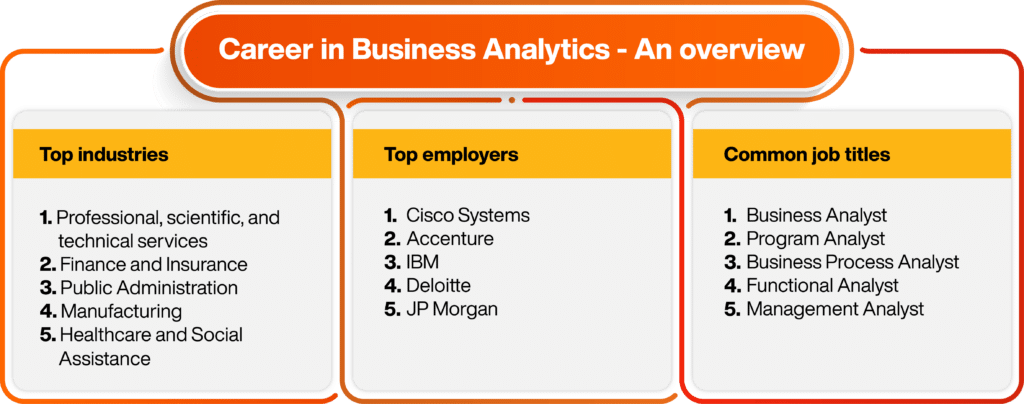Business analytics implies turning data into insights that help businesses make better decisions. It is a crucial part of data science, and it is becoming increasingly important as companies collect more and more data.
Business analytics can help businesses understand their customers, make better marketing decisions, optimise their operations, and much more. In short, it is a powerful tool that can improve just about any aspect of a business.
If you are interested in business analytics careers, you should know a few things. First, you must have strong maths and programming skills. Second, you must be able to effectively communicate your findings to non-technical people. And third, you must be able to work with large data sets.
A business analytics career can be very rewarding if you have the skills and the interest. You’ll get to help businesses make better decisions and have the opportunity to work with some of the latest technologies.
What is business analytics?
To get a job in the business world, you need to understand the basics of business analytics. It is not just about using spreadsheets and Excel. It is about understanding how data can be used to make decisions and improve your company’s bottom line. As a business owner or manager, you’re always looking for ways to enhance the efficiency of your operations—and that includes using data-driven strategies to ensure things run smoothly.
Business analytics can help you do this by providing information about how customers interact with your product or service, their problems with it, and how satisfied they are with it. By understanding these things, you can start making informed decisions based on factual data instead of guessing what will work best for your company.
The term “business analytics” has been around for a while, but it is gaining popularity as more companies realise the advantages of using data to make decisions. Businesses now have access to a wealth of information that was once only available through expensive and time-consuming surveys or focus groups.
The business analytics role is more than just tracking the number of customers you have. It is about understanding your company’s and customers’ needs so that you can make smarter decisions about how to serve them. To do this, you need to understand trends in your data, track the performance of key metrics over time, and look at how different factors affect those metrics. You can even use this information to improve customer satisfaction and increase loyalty by understanding what people like about your product or service.
READ MORE: What is Business Analytics: An overview
What are the main components of business analytics?
Business analytics is also the practice of using data to make informed decisions in business. It is a critical component of any company that needs to be successful, and it is essential for those businesses that operate in the digital age.
The four main components of business analytics are:
- Data collection: This includes gathering information from various sources, including people who work for the company and customers who have interacted with it on social media.
- Data analysis: This involves looking at the collected data and making sense of it, which can include looking at trends over time or comparing different sets of data from various sources.
- Business intelligence: This involves creating visualisations that make sense from all this information and help you understand what’s happening inside your company or organisation.
- Reporting: Reporting allows you to communicate what you’ve learned about your business through visualisations, text reports that others can read, and presentations.
Business analytics is often used to improve customer satisfaction and increase revenue. Analytics can also be used to help companies reduce costs and increase efficiency.
Analytics involves collecting data from multiple sources, analysing it, and then making decisions based on that analysis. The most common data types are quantitative (such as sales figures) and qualitative (such as customer feedback).
Scope of business analytics careers
The business analytics career scope is wide and varied. Business analysts can work in various industries, including government, healthcare, retail, and manufacturing. They are also able to work for both small and large companies, as well as mid-sized businesses. The business analyst job description will help set up the process and ensure it works according to plan. A business analyst role can be applied in any field, but it is widespread in finance and marketing.
There are many different kinds of business analyst jobs that you can choose from if you want to get into this field. For instance, software developers are becoming less common in the workplace because they require specialised skills only certain people have. The same goes for data analysts who use statistical models to predict trends in data sets. To have a business analyst career, you won’t need any special training — you just need at least an undergraduate degree or equivalent experience in your field.
You might think that being a business analyst means sitting at a desk all day analysing data and writing reports. But don’t worry—it doesn’t have to be like that! You may find yourself doing some of these things in your job:
- Reviewing financial reports and other documents
- Analysing data sets for patterns or trends
- Creating models that explain relationships between variables
A business analyst’s job description helps companies make decisions about their products, services, and processes. They’ll work with various departments and stakeholders to determine what their customers want, how they want it delivered, and how much it will cost them.
They often collaborate with other professionals within their company, including marketing or sales teams, product managers, and developers. Business analysts can also collaborate with external vendors or suppliers when necessary.
Although many businesses use business analysis as part of their daily operations — from manufacturing to software companies — there aren’t any strict boundaries between the different types. You can find yourself working at any level within an organisation (with or without titles) as you learn more about your industry’s needs along the way!
A business analytics career might start as an entry-level analyst, working as part of a team that gathers and analyses data within their company. As they gain experience, they may move on to become a more specialised analyst who focuses on one aspect of the company’s operations.
Those interested in having a business analyst’s career should consider whether their interests align with the industry in which they work.
What jobs can you get with a Masters in business analytics?

A Master’s in business analytics opens several business analyst job opportunities for you.
- Business analyst
Business analysts are in charge of making sure that the products and services you offer as a company are going to be useful, useful enough that people will want to use them. They translate the needs of all these different groups into something that’s actually useful for users. The goal is always to make sure your company is producing products and services that are well-received by your target audience.
- Data scientist
Data scientists are the people who make sense of data and turn it into useful information. They’re in charge of analysing large amounts of data and turning it into information that can be used to make better decisions.
Data scientists often work with machine learning algorithms and statistical tools, as well as programming languages like Python and R. They also have to know how to use databases like SQL (Structured Query Language). A lot of the time, they’ll have to take a very technical approach to their work—working with code, programming languages, and other tools that make up the foundation of any software system.
- Business intelligence analyst
Business intelligence analysts are the people who design, create and maintain the data that powers your business. They work with a variety of data sources to pull together information such as sales numbers, customer data and market trends. These professionals help business owners make important decisions about how to run their company.
- Business systems analyst
Business systems analysts are responsible for identifying, developing, and implementing business systems to help a company run more efficiently. They work in many different industries, but they all share the same goal: to help companies with their day-to-day operations. This can mean anything from making sure that the company’s internal systems are working correctly to creating new software that allows them to better manage their employees or customers.
- Reporting analysts
Reporting Analysts are responsible for analysing data, identifying trends and patterns, and translating that information into meaningful reports. They typically need to be able to perform complex calculations and manipulate data in order to produce accurate reports, so they must be proficient in statistical software such as Excel.
- Operations analyst
An operation analyst typically works with the company’s IT department to ensure that all systems are operating smoothly. This means that they must be able to identify any issues or problems within the system and then come up with solutions on how to fix them. The role also involves working closely with other departments within the company, such as sales, marketing and human resources (HR).
Skills required for business analyst
Business analysis is a profession that requires you to understand how different businesses work and how they could function better. This requires you to see the big picture and understand the processes that companies use, even if those processes are not always easy for you to understand on your own.
The best way to train yourself for this kind of work is through experience. There’s no better way than actually doing it — so make sure you have some! You can learn from books and videos, but there’s nothing like hands-on practice.
But what do these people do exactly? Let’s start with their day-to-day tasks:
- Collecting data about the company and its customers
- Analysing that data
- Using that analysis to create recommendations for improving operations or products
- Communicating those recommendations with other parts of the organisation so they can be acted upon
Business analysts use their skills to create, build and maintain a company’s business models. They analyse the data the business operates and help make it more efficient. The skills required to make a business analyst include:
- Analytical skills
Business analysts need to collect information from different sources and analyse it to make informed decisions about what should change or improve at a company. This can involve reading through documents or talking with people who work for the company itself.
- Interpersonal skills
Business analysts need to know how to work with other people on projects, which means being able to adjust their approach based on what they hear from them. They also need good listening skills, so they can pick up on cues that indicate when someone else has something important to say or needs help solving a problem.
- Problem-solving skills
This is essential to analyse anything — whether it is a problem with your business or a challenge at work or home. If a solution works well enough, it becomes part of your toolkit for solving problems in the future! In particular, problem-solving involves diagnosing the problem, coming up with solutions, and testing them out until they work.
- Communication — both written and verbal
Business analysts need to be able to write clearly about their findings and explain how those findings relate to other things they have done or are working on now. They also need to communicate effectively with other team members so everyone understands what needs to be done next — and why! Business analysts need to understand how their customers think, so they can speak their language. They must express themselves clearly and concisely, in person or via email.
READ MORE: 15 key skills and tools business analysts needs to succeed
Future of business analytics
Business analysts’ job descriptions state many opportunities and professionals report high job satisfaction and work-life balance, making it a good career choice. One of the benefits of working in business analysis is that the opportunities are nearly infinite. Because they can work in a variety of teams and industries, their career paths can be very different. The task itself will determine whether or not you are a good fit for the position.
Business Analysts are employed by a wide range of enterprises, as well as non-profit and government organisations. In other words, there are virtually no limitations to what you may do as a business analyst in terms of employment opportunities.
It may be challenging to track the best training in business analysis. With so many alternatives, it is hard to know where to begin. Online Manipal has compiled a collection of business analysis courses offered to help you get started. Beginner to expert business analysis courses are all available from the prestigious Manipal Academy of Higher Education (MAHE).
Become future-ready with our online M.Sc. in Business Analytics program









